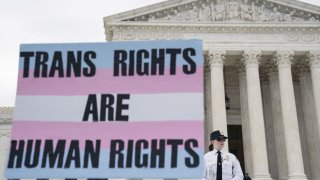
Texas Gov. Greg Abbott (R) ordered the state's Department of Family and Protective Services to investigate gender-affirming care for transgender youth as child abuse following an opinion offered this week by Texas Attorney General Ken Paxton (R).
The letter, which was also sent to the Health and Human Services Commission, the Texas Medical Board, among others, comes after Paxton tweeted an opinion that surgical procedures and hormone therapy are forms of child abuse and are therefore illegal under existing Texas law, specifically Texas Family Code 261.001 (1)(a)-(d), and therefore should be investigated by the DFPS.
According to Abbott, it should be considered illegal "to subject Texas children to a wide variety of elective procedures for gender transitioning, including reassignment surgeries that can cause sterilization, mastectomies, removals of otherwise healthy body parts, and administration of puberty-blocking drugs or supraphysiologic doses of testosterone or estrogen."
Abbott also said the parents of children who allow such procedures to take place should also be investigated by the DFPS.
Get top local stories in DFW delivered to you every morning. Sign up for NBC DFW's News Headlines newsletter.
Neither Abbott nor Paxton offered any medical insight into why the procedures should be classified as child abuse and opinions offered by the attorney general are not law.
The recommendation goes against the nation's largest medical groups, including the American Medical Association, which have opposed Republican-backed restrictions filed in statehouses nationwide.
Both Abbott and Paxton are up for reelection this year, and their actions came a week before they are on the ballot for Republican voters in Texas's first-in-the-nation primary of 2022.
Lone Star Politics
Covering politics throughout the state of Texas.
The immediate impact of the order was unclear and a spokesman for the Texas Department of Family and Protective Services said there were no open cases based on the governor's directive.
The uncertainty over the impact is largely due to the fact that attorney general opinions do not carry the weight of law.
“Since this is a nonbinding opinion by the attorney general right now, it’s unclear what will happen next,” Kate Murphy, senior policy associate for child protection at Texans Care for Children, told NBC 5 partner Dallas Morning News. “Right now, we have more questions than answers.”
In Houston, the county office that represents the state in civil child abuse cases said it would not take any actions based on the letter, and Texas' largest child welfare advocacy group said it was unclear what judges and prosecutors would do with the opinion.
"What is clear is that politicians should not be tearing apart loving families -- and sending their kids into the foster care system -- when parents provide recommended medical care that they believe is in the best interest of their child," Murphy added.
Emmett Schelling, executive director for the Transgender Education Network, said that for trans youth, coming to terms with their identity comes at an early age.
When he was a child, Emmett began to even prefer wearing certain masculine clothes over feminine ones, alluding to his transgender identity. His red overalls were preferable to the dress his sister had him once wear. This social transition that occurs among trans youth should be respected, Schelling said.
“We understand that we want to be honest with ourselves and with everyone that we interact with,” Schelling said. “We want to be honest with who we are in this world.”
Schelling also added that the root of the governor’s concern, surgical procedures on trans youth, is also simply put, not a thing and that they are reserved for adults.
“When we talk about this, understand that this is a social transition,” he said. “We’re not castrating anybody. We’re not pulling organs out of children.”
As for gender-affirming surgeries overall, those procedures are not always a priority for transgender persons, Schelling said. An adult, not a child, who can afford surgical procedures to transition is often rare since those procedures are not covered by insurance.
“There’s so much emphasis on surgical procedures and that’s simply not happening,” Schelling said.
Additionally, even talking about these sorts of procedures are private matters that, for trans people, become public matters.
“We, as a general public, don’t necessarily deserve to be in everybody else’s medical business,” Schelling said. “There’s a fundamental line that’s been blurred around trans people.”
As a result of Abbott’s letter, which did not include medical or scientific insight, Schelling said trans people are at further risk of further discrimination under the law and by society.
Paxton's opinion and Abbott's letter come months after Texas Republican legislators-- who filed more anti-LGBTQ proposals last year than in any other statehouse -- proposed laws banning such treatments but failed to pass them.
Arkansas became the first state to pass a law prohibiting gender confirming treatments for minors, and Tennessee approved a similar measure.
Numerous states, including Texas, also have enacted laws banning transgender students from competing in scholastic sports on the basis of their gender identity.
Cathryn Oakley, state legislative director and senior counsel for the Human Rights Campaign, said no other governor has taken the same action as Abbott. She called it a "lawless interpretation" and expressed worry for parents.
"The terror that is being struck into their hearts is very real," Oakley said. "I'm also thinking about the kids who are relying on that care and how frightened they are."
Paul J. Weber, with The Associated Press, contributed to this report.



